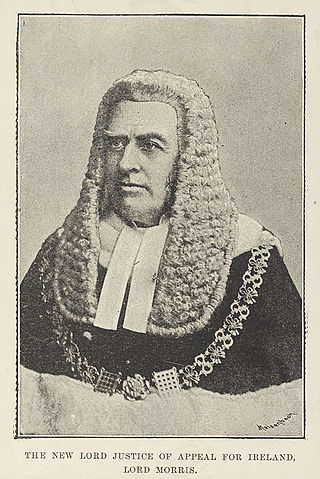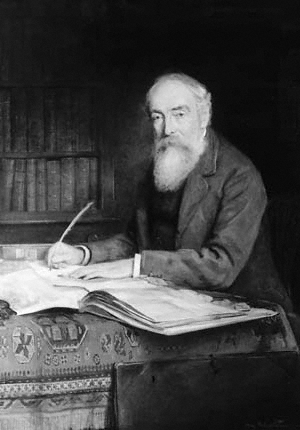
Marquess of Normanby is a title that has been created twice, once in the Peerage of England and once in the Peerage of the United Kingdom. The first creation came in 1694 in the Peerage of England in favour of John Sheffield, 3rd Earl of Mulgrave. He was a notable Tory politician of the late Stuart period, who served under Queen Anne as Lord Privy Seal and Lord President of the Council. In 1703 this first Marquess of Normanby was further honoured when he was made Duke of Buckingham and Normanby. These titles became extinct on the death of the 2nd Duke in 1735.

Baron Sheffield is a title that has been created four times: once in the Peerage of England, twice in the Peerage of Ireland, and once in the Peerage of the United Kingdom.

Baron Stanley of Alderley, in the County of Chester, is a title in the Peerage of the United Kingdom. It was created in 1839 for the politician and landowner Sir John Stanley, 7th Baronet.

Baron Eddisbury, of Winnington in the County Palatine of Chester, is a title in the Peerage of the United Kingdom. It was created on 12 May 1848 for the Whig politician and diplomat Edward Stanley (1802–1869), son of the politician Sir John Stanley, 7th Baronet.
Baron Ogmore, of Bridgend in the County of Glamorgan, is a title in the Peerage of the United Kingdom. It was created on 10 July 1950 for David Rees-Williams, a Welsh Labour, and later Liberal, politician. As of 2020 the title is held by his grandson, the fourth Baron, who succeeded his father in that year.

Baron Killanin, of Galway in the County of Galway, is a title in the Peerage of the United Kingdom.

Baron Wynford, of Wynford Eagle in the County of Dorset, is a title in the Peerage of the United Kingdom. It was created in 1829 for the politician and lawyer Sir William Best. He served as Chief Justice of the Common Pleas from 1824 to 1829. His eldest son, the second Baron, represented Mitchell in the House of Commons from 1831 to 1832, when the constituency was abolished. On the death of his younger son, the fourth Baron, this line of the family failed. The late Baron was succeeded by his first cousin, the fifth Baron. He was the son of Reverend the Hon. Samuel Best, third son of the first Baron. As of 2023 the title is held by his great-grandson, the ninth Baron, who succeeded his father in 2002.
Baron Nathan, of Churt in the County of Surrey, is a title in the Peerage of the United Kingdom. It was created on 28 June 1940 for the lawyer and politician Harry Nathan. As of 2010 the title is held by his grandson, the third Baron, who succeeded his father in 2007.
Baron Silkin, of Dulwich in the County of London, is a title in the Peerage of the United Kingdom. It was created on 4 July 1950 for the solicitor and Labour politician Lewis Silkin. The peerage was disclaimed by both his eldest son, the second Baron, and the latter's nephew, the third Baron. When the third Baron disclaimed the title in 2002, the barony of Silkin became the first peerage ever to be disclaimed twice; and the only disclaimer since the House of Lords Act 1999

Baron Morris, of St John's in the Dominion of Newfoundland and of the City of Waterford, is a hereditary barony in the Peerage of the United Kingdom which was created on 15 January 1918 for the lawyer and politician Sir Edward Morris upon his retirement as Prime Minister of Newfoundland.
Baron Marks of Broughton, of Sunningdale in the Royal County of Berkshire, is a title in the Peerage of the United Kingdom. It was created on 10 July 1961 for Simon Marks. He was chairman and managing director of the retail chain Marks & Spencer, a company co-founded by his father Michael Marks. As of 2010 the title is held by his grandson, the third Baron, who succeeded his father in 1998.
Baron Burden, of Hazlebarrow in the County of Derby, is a title in the Peerage of the United Kingdom. It was created in 1950 for the Labour politician Thomas Burden. He had previously represented Sheffield Park in the House of Commons and after his elevation to the peerage served as a Lord-in-waiting from 1950 to 1951 in the Labour administration of Clement Attlee.
Baron Darwen, of Heys-in-Bowland in the West Riding of the County of York, is a title in the Peerage of the United Kingdom. It was created on 12 February 1946 for John Davies, a prominent cotton manufacturer. He served as a Lord-in-waiting from 1949 to 1950 in the Labour administration of Clement Attlee. As of 2011 the title is held by his great-grandson, the fourth Baron, who succeeded his father in 2011.

Baron Cullen of Ashbourne, of Roehampton in the County of Surrey, is a title in the Peerage of the United Kingdom. It was created on 21 April 1920 for Sir Brien Cokayne, Governor of the Bank of England from 1918 to 1920. As of 2017 the title is held by his grandson, the fourth Baron, who succeeded his uncle in 2016.

Frank Soskice, Baron Stow Hill, was a British lawyer and Labour Party politician.
Baron Renwick, of Coombe in the County of Surrey, is a title in the Peerage of the United Kingdom. It was created on 23 December 1964 for the businessman and public servant, Sir Robert Renwick, 2nd Baronet. He notably worked for the Air Ministry and the Ministry of Aircraft Production during the Second World War. The Renwick Baronetcy, of Coombe in the County of Surrey, was created in the Baronetage of the United Kingdom on 28 June 1927 for his father, Harry Renwick. As of 2020 the titles are held by the first Baron's grandson, the third Baron, who succeeded in that year. The second baron was active in the House of Lords until the House of Lords Act 1999, when he lost his seat in parliament.
Harry Morris, 1st Baron Morris of Kenwood was a British Labour Party politician.
Harry Morris may refer to:
The 1950 Sheffield Neepsend by-election was a parliamentary by-election held on 5 April 1950 for the British House of Commons constituency of Sheffield Neepsend in Neepsend, an industrial suburb of the city of Sheffield.
Lord Morris is the name of:









